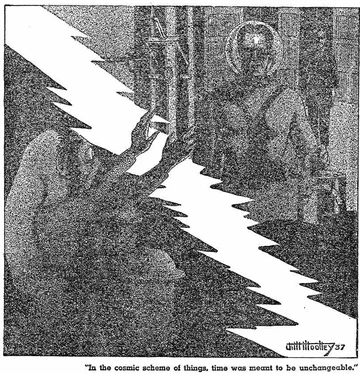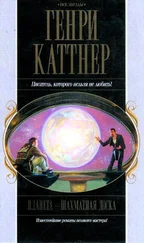Генри Каттнер - World’s End
Здесь есть возможность читать онлайн «Генри Каттнер - World’s End» весь текст электронной книги совершенно бесплатно (целиком полную версию без сокращений). В некоторых случаях можно слушать аудио, скачать через торрент в формате fb2 и присутствует краткое содержание. Год выпуска: 1938, Жанр: Фантастика и фэнтези, на английском языке. Описание произведения, (предисловие) а так же отзывы посетителей доступны на портале библиотеки ЛибКат.
- Название:World’s End
- Автор:
- Жанр:
- Год:1938
- ISBN:нет данных
- Рейтинг книги:4 / 5. Голосов: 1
-
Избранное:Добавить в избранное
- Отзывы:
-
Ваша оценка:
- 80
- 1
- 2
- 3
- 4
- 5
World’s End: краткое содержание, описание и аннотация
Предлагаем к чтению аннотацию, описание, краткое содержание или предисловие (зависит от того, что написал сам автор книги «World’s End»). Если вы не нашли необходимую информацию о книге — напишите в комментариях, мы постараемся отыскать её.
World’s End — читать онлайн бесплатно полную книгу (весь текст) целиком
Ниже представлен текст книги, разбитый по страницам. Система сохранения места последней прочитанной страницы, позволяет с удобством читать онлайн бесплатно книгу «World’s End», без необходимости каждый раз заново искать на чём Вы остановились. Поставьте закладку, и сможете в любой момент перейти на страницу, на которой закончили чтение.
Интервал:
Закладка:
This was a white world, splashed with crimson. And it was cold—terribly so. Blake switched on the electric heating-coils, but despite them and despite the insulation of his clothing he shuddered with the fearful cold. World of snow, reddened with the rays of a huge, scarlet sun!
Stars glittering icily in a black sky, in which a round red ball hung. The atmosphere must be tenuous, then—but why? After all, a hundred thousand years was only a day in a planet’s life. What had brought this untimely death to earth?
An intolerable sense of desolation gripped Blake. Was there no life anywhere on earth? Did the snow blanket lie like a pall from equator to pole? As he wondered he caught a flicker of movement far away, and, remembering that there were binoculars in the heterogeneous pile at his feet, he hastily began to search for them.
But they revealed little. Oddly, it seemed as though the sky, near the horizon, was moving. Little twinkling streaks of light seemed to flicker eerily across the horizon, like fireflies darting across a wall of basalt. How close Blake’s simile was to the truth he was soon to learn.
For the horizon marched! Like a sky-towering wall the jewel-streaked blackness rushed toward him, incredibly—alive! It was like a great ramp stretching across the horizon as far as he could see, and inexorably, inevitably, the wall moved toward him. Blake thought of a wave, rushing across the snow.
He took the binoculars from his eyes and involuntarily gasped. The great wall was menacingly close—perhaps thirty miles distant, and apparently hundreds of feet high. Still Blake could not identify it. Smooth, glistening blackness, shot with tiny, darting sparks and streaks of light. And Blake sensed life in the thing—malignant life.
It was rushing toward him with amazing speed, faster than the swiftest airplane. In a few moments now it would reach him, overwhelm him. At the thought Blake’s hand went out to the bakelite lever.
But he did not touch it. Amazingly, the scene had changed. The red-splashed snow, the onrushing ramp of blackness, were gone! They had faded and vanished like mist, and in their place had grown another scene, utterly different, utterly—alien.
The platform of the Time Machine rested on a floor of white stone, and far above was a dome roof of the same substance. The circular room was vast—nearly half a mile in diameter. Blake judged. Here and there were curious machines, the purpose of which he could not guess. Save for the machines, the great chamber was empty. The penetrating cold was gone, and Blake switched off the heating-coils in his suit.
A little spot of light began to glow in the air near the platform. Blake stopped to snatch up a revolver, and for a moment his eyes were turned away. When he looked again, a man was standing where the light had been.
A strange man, indeed. Blake’s eyes went wide as he stared at the stocky, dwarfed body, the slender hands, with fingers that seemed almost like tentacles—and the astounding head of the being. At first Blake thought the man was a hunchback, and then he realized that the sack-like object that hung down and rested on the dwarf’s back was actually a part of his skull. The head, seen from the front, seemed normal, although the eyes were abnormally large, and the mouth little more than a tiny slit; but the back of the skull was elongated into a two-foot-long cylinder of pulpy white flesh that hung down almost to the floor. And yet that was the logical evolution of the brain-case, Blake realized, for the man’s slender neck could scarcely support the weight of a huge, globular cranium. Any misstep would, in such a case, topple the top-heavy head to one side and result in a broken neck. Logical—but fantastic, strange beyond imagination!
The stocky body was clothed in glistening, metallic mesh. One of the slender arms swung up, palm forward, in the immemorial gesture of peace.
Blake thrust the revolver into his belt, but did not relax his wariness. He said, “Who are you?”
As he had expected, the other gave no sign of understanding. A gulf of a hundred thousand years separated the languages of the two. Yet the future-man bridged the gulf in a way that was astounding in its simplicity.
After a pause a voice said, “I am called Nak.”
Blake’s eyebrows shot up in bewilderment. He had been watching the dwarf’s lips, was sure that they had not moved. And, strangely, he could not distinguish the voice’s tone—whether it had been flat, shrill, or harsh.
Again the voice, “I am Nak. I am not speaking—not orally. It is my mind you hear.”
Blake gasped, “Your mind?”
“Yes. Thought-transference—telepathy. The vibrations of my mind impinge upon yours.”
“But I hear you——”
“No, you do not. That is habit. Your brain transmits my thoughts to the auditory nerves, where they are translated into your tongue. When you speak, your words alone would be gibberish, but I receive the thoughts behind your words as well—and automatically translate them into my own language. Our race has conversed thus for thousands of years.”
Blake said, “Are you—a friend?”
“Yes. You are puzzled. Your mind is confused. I can see—you have come through time.” There was a flicker of expression on the narrow face, with its great eyes. “From the past ... but I thought there was never any successful time-projector built.”
“I was the first,” Blake said, “so far as I know—but that was very long ago.”
“The date?”
Blake told him. The other shook his head in a gesture of bewilderment. “In all history there is no record of such a success. Not even when the Doom brought about the Renaissance of Science——”
“The Doom?” Abruptly Blake remembered the marching ramp of blackness. “The—how did I get here? How did you——”
“I transported you here, by means of a physical process I do not think you could understand. It is a matter of warping space—as a sheet of paper can be folded until opposite edges touch. For a moment the Seventh Circle—where you were—and this room were touching, in hyperspace. It was a development of the old radio transmission of matter.”
The future-man, Nak, had been eyeing the Time Machine curiously. Now he came forward, fumbling at his belt. Blake retreated a step.
“I mean no harm,” the strange telepathic voice said. “Your coming has brought hope to the world—where I am one of a dozen survivors. But—you cannot understand. I must show you. Watch that machine.”
He gestured, and Blake stared at a huge machine forty feet distant—a creation of gleaming metal and softly glowing lights. Abruptly the lights flashed out blindingly. Then in the place of the machine was a screen of lambent radiance, oval, twenty feet tall. Shadows crawled across it. They grew clearer. They became—pictures!
A city flashed into the foreground, seen from the air—New York, in Blake’s day. Yet Blake recognized odd discrepancies—an airplane flew past, and it was an awkward machine of pre-war days. A ship visible in the harbor was an old-fashioned sailing-vessel. The buildings were windowless.
“It is a reconstruction,” Nak said. “Histories are not always accurate, especially when dealing with times so remote. Watch.”
The scene shifted. There was a glimpse of racing green water. Another city grew—Sydney, Australia, Blake thought. It faded; there was only the white expanse of a sun-parched desert.
Abruptly there was a blinding flash of light—soundless. When it passed Blake saw a great crater, still smoking, gouged out of the desert.
“A meteor,” Nak said. “The seed of the Doom.”
The scene changed again. Now the desert seemed less arid as though dozens, perhaps hundreds of years, had passed. At the bottom of the crater was visible a little splotch of black. It glittered in the glaring sunlight.
Читать дальшеИнтервал:
Закладка:
Похожие книги на «World’s End»
Представляем Вашему вниманию похожие книги на «World’s End» списком для выбора. Мы отобрали схожую по названию и смыслу литературу в надежде предоставить читателям больше вариантов отыскать новые, интересные, ещё непрочитанные произведения.
Обсуждение, отзывы о книге «World’s End» и просто собственные мнения читателей. Оставьте ваши комментарии, напишите, что Вы думаете о произведении, его смысле или главных героях. Укажите что конкретно понравилось, а что нет, и почему Вы так считаете.

![Генри Каттнер - Очи Тхара [The Eyes of Thar]](/books/28174/genri-kattner-ochi-thara-the-eyes-of-thar-thumb.webp)








![Генри Каттнер - Сын несущего расходы [= Сын волынщика; Один из несущих расходы]](/books/255796/genri-kattner-syn-nesuchego-rashody-syn-volynchik-thumb.webp)